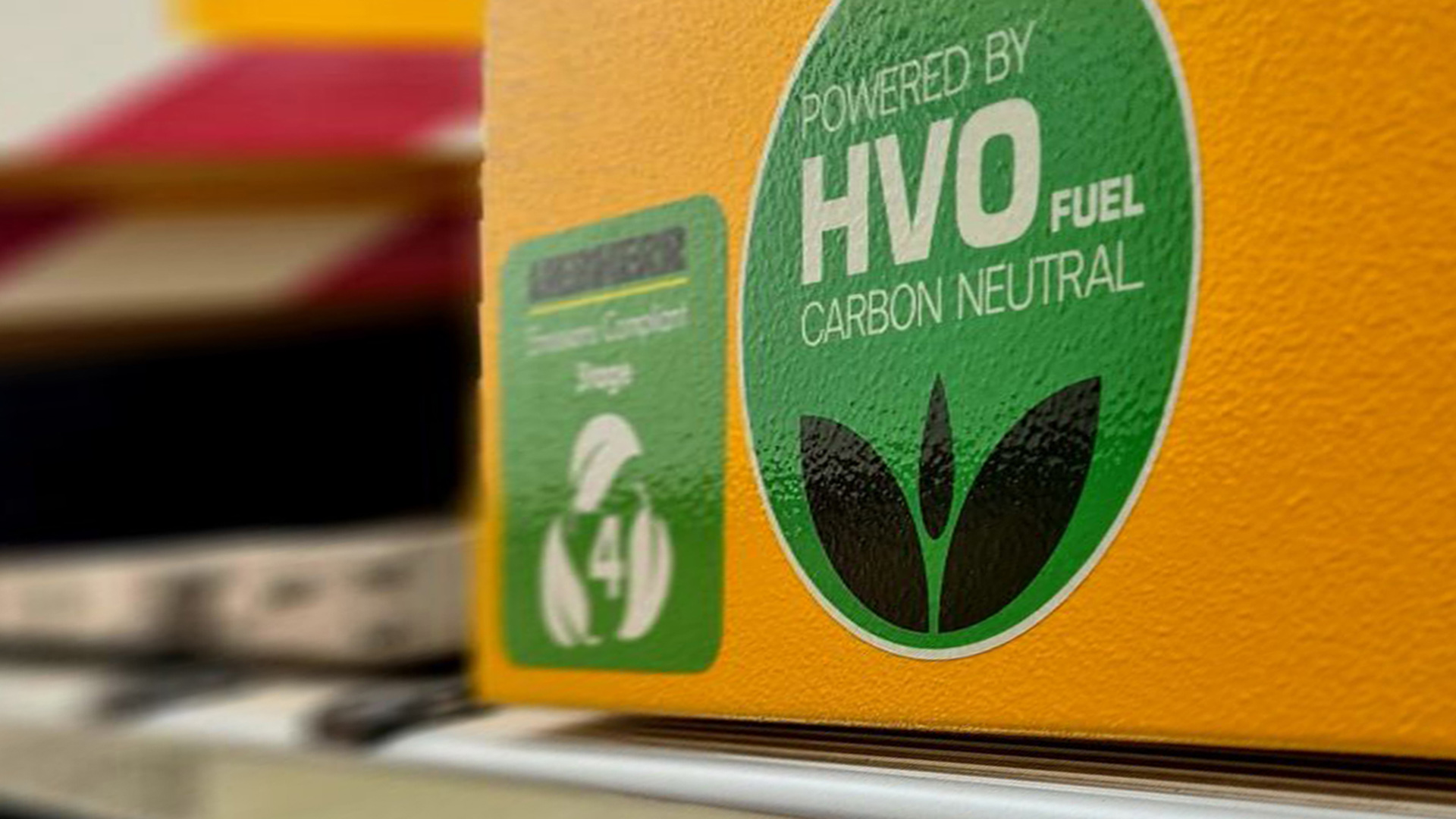A suitable solution
When it comes to his conviction, Peter Gibbs can be very persistent. “That won’t work, it’s uneconomical and just a fanciful hope of some free spirits ...” There was no lack of reservation and scepticism when, as CEO of the largest independent mobile crane hire company in the UK, he took a radical decision a year ago to convert the entire fleet of more than 400 mobile cranes to a green alternative to diesel. By adopting Hydrotreated Vegetable Oil (HVO), made from vegetable waste and utilised in much the same way as traditional diesel, Ainscough took a step into the unknown for the crane hire industry.

“The move away from fossil fuels is unavoidable for the energy transition. Legislators have already set the course for this, both nationally and internationally. With proof of delivery to reduce CO₂ now required, customers are placing more and more value on sustainability. The question therefore arises as to which technology path is most suitable for achieving the climate goals," explains Gibbs. “We didn’t want to wait and see what would happen, but rather find a solution that suits us, our tasks and our cranes. We don’t see climate protection as a restriction, but rather as an opportunity for our company, our employees and our customers.”
Powered by plants
For Ainscough, HVO is the clear interim solution – a fuel that works like diesel, but uses purely vegetable energy from food waste, vegetable fats or vegetable waste instead of fossil energy. In the production process, the vegetable oil obtained is converted into hydrocarbons in a catalytic reaction with the addition of hydrogen, which can power an internal combustion engine and reduce CO₂ emissions by around 90 per cent. “The big advantage: diesel engines continue to function as before – but in a more climatefriendly way," explains Peter Gibbs. No adjustments are required on the crane. It is important that the infrastructure for the supply of HVO is built.

Alongside Liebherr’s trials, Ainscough conducted an operational trial of HVO in 2021, says Gibbs. “Following the success of this trial and in alignment with our values, in 2021 we decided to be demonstrably the first climate-neutral company in our industry by October 2023. This required us to take a holistic approach to the transition from the outset, converting our nationwide network of 30 sites with over 400 cranes and the UK’s largest heavy transport fleet to HVO.” This was completed for all operational equipment within the three months running up to April 2022.
Ainscough was helped by the fact that its fleet consists only of Liebherr mobile cranes. The two companies have worked together closely since as early as 2006. That’s how Peter Gibbs knew he would have a “reliable and proactive partner” in Liebherr regarding all the technical and infrastructural adjustments associated with HVO. And vice versa, says the tech-savvy CEO: “Our 70 Ainscough engineers have long since also become proven Liebherr experts with comprehensive system knowledge. This immediately brings a safe, reliable, high-quality and environmentally friendly service offering to our customers.”
As very heavy equipment, mobile cranes are amongst the highest CO₂ emitters on a construction site. The dimensions of such a crane alone make this obvious. The LTM 1230-5.1, the latest addition to the Ainscough fleet, has five axles, a 75-metre telescopic arm and a lifting capacity of up to 230 tonnes. It, too, now runs on HVO.
Persistence has paid off and is future-proofing our business.
A successful partnership
“Liebherr has always been very proactive and cooperative in identifying and developing solutions to reduce emissions, for example in single-engine technology, tyre pressure monitoring or the display of operating conditions on the LICCON monitor. When switching to HVO, it really helped us that Liebherr had already tested this fuel extensively and was able to contribute very meaningful documentation for our decision-making process. Liebherr played a real pioneering role here and made a difference,” says Gibbs.
“Another decisive factor for the success of our gamechanging project was Liebherr’s readiness to get involved in the cooperation and invest time and money themselves to get the HVO solutions ready for the market. Liebherr is very much in line with our own corporate values, making it the partner of choice.”
The availability and production capacities of HVO are still limited, and there is always concern that biofuels will unintentionally begin competing with food if not only vegetable waste is used. Currently there are no UK-based refineries. “We source the fuel from a dedicated ‘Green HVO’ supplier who guarantees via independent auditing that we only use HVO from renewable sources," Gibbs emphasises. On this basis, Ainscough has now converted all its crane and truck filling stations from diesel to HVO, creating an HVO network of 30 sites – the first in the UK. This also arouses interest among customers. “We have already had enquiries as to whether and how our UK HVO network could also cover their other fuel needs in the future.”
For Peter Gibbs, all this is both a confirmation and a demand for Ainscough to always be one step ahead. It’s fitting that the first major goal was achieved ahead of schedule. “In April 2022, the company were proud to announce a 96 per cent reduction (year on year) in CO₂ through HVO and some additional measures which, combined with a small compensation package, has enabled us to become the first national crane business in the world to achieve a 100 per cent carbon-neutral run rate. Persistence has paid off and is future-proofing our business.”




